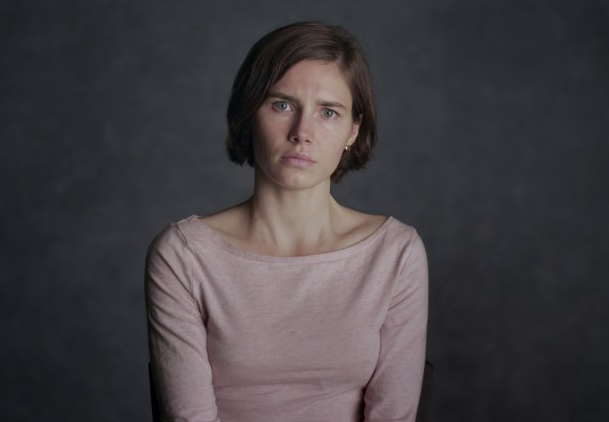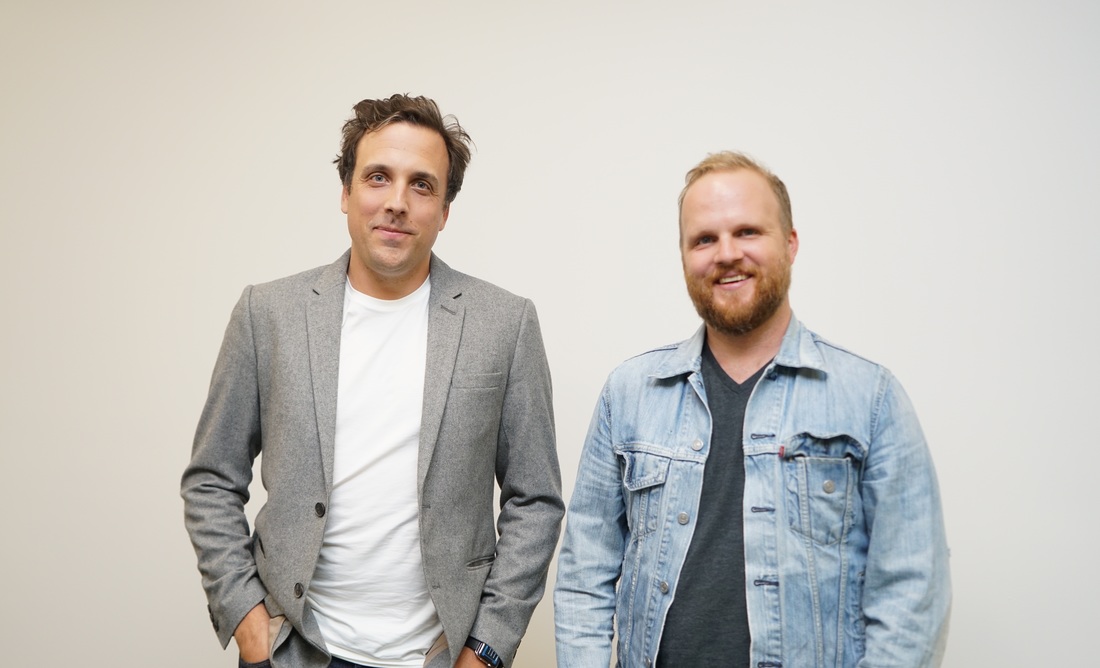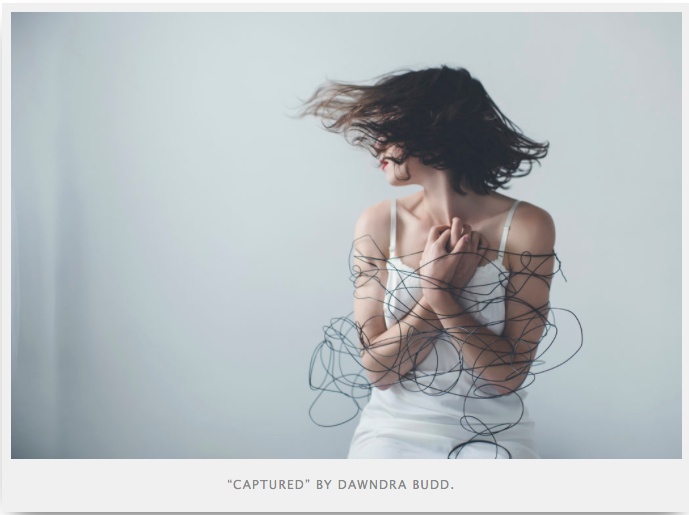|
Film by Rod Blackhurst and Brian McGinn just named one of year's best
Countless newspaper articles, books and television news segments have been devoted to Amanda Knox since her arrest in Italy nine years ago on a murder charge. But a new Netflix documentary may prove the definitive exploration of the case.
Rod Blackhurst and Brian McGinn co-directed Amanda Knox, debuting today (September 30) on the streaming network. They interviewed many key people in the case, including prosecutor Giuliano Mignini and Nick Pisa, the first journalist on the story. Most importantly, they gained the participation of Knox herself, and her onetime boyfriend and co-defendant, Raffaele Sollecito. Either I'm a psychopath in sheep's clothing or I am you.
The documentary delves meticulously into the details of the complicated case: in 2007 Knox was a 20-year-old Seattle native studying in Perugia. Among her roommates on Via della Pergola 7 was British exchange student Meredith Kercher.
The day of November 7, 2007 Kercher's lifeless body was discovered in her bedroom in the apartment; she had bled to death from stab wounds. Knox said she had spent the previous night at Sollecito's apartment and therefore had an alibi, but investigators quickly turned their focus onto her.
SHARE THIS:
Magnini, the prosecutor, found Knox's behavior suspicious in the wake of the murder and suspected a woman had been involved in the killing because only a female would have thought to throw a blanket over Kercher's naked corpse.
In December 2009 Knox and Sollecito were found guilty of murder. A third defendant, Rudy Guede, had been tried separately and found guilty. Two years later Knox and Sollecito were released by an appeals court which ordered the case retried. At that retrial Knox and Sollecito were once again convicted. But in March of last year Knox and Sollecito were acquitted once and for all by Italy's Supreme Court of Cassation, which found serious flaws in the investigation. But there are many who remained convinced Knox was involved in Kercher's death. Some of them are blasting the filmmakers on Twitter, although presumably they haven't had the opportunity to see the documentary yet.
Nonfictionfilm.com spoke with directors Blackhurst and McGinn in Los Angeles and asked them if they consider the case against Knox and Sollecito closed. In a word, their answer was yes.
"In 2015 the Italian Supreme Court acquitted them, said that there wasn't enough evidence to charge them with the crime and that the evidence indicates the involvement of Rudy Guede," Blackhurst said. Despite some Twitter attacks, critics are responding favorably to the film, which premiered at the Toronto International Film Festival earlier this month. The DOC NYC film festival just shortlisted Amanda Knox as one of the 15 best documentaries of the year. The NFF conversation with Blackhurst and McGinn ranged from the question of narratives to Knox's imperfect defense of herself. What follows is an edited version of our exchange. Nonfictionfilm.com: It seems like your film couldn't come at a better time, with so much attention being paid to true crime stories -- ESPN's O.J. Simpson documentary, the Investigation Discovery series on the JonBenét Ramsey case, and HBO's The Jinx to name a few. Rod Blackhurst: We started in 2011 before these things were seemingly du jour, of course, so there was no way of knowing where it would end up. The reason why the film is coming out now is it was only last year that the Italian Supreme Court reached their final conclusions in the case and came to their final judgment. We'd like to think as well that the film is a human story about the people at the heart of this tragic event that was turned into this story presented to us as this true crime saga, but had lost track that there was a real human experience at the heart of it and that there was a tragedy at the heart of this story.
NFF: One of the things that's clear in the film is this notion of the creation of narratives. They don't come out of a vacuum. They are culturally embedded. There may be differences in Italy but there are narratives there about how people ought to behave. You get put into a narrative and it's pretty hard to get out of.
Blackhurst: That was honestly the very first pitch that we wrote for this movie -- about being trapped in a narrative. And it happened really to everyone in this story, no matter which side you're on... I think that we haven't seen a lot of stories like this that have entrapped people in that way, in such a kind of straightforward manner. I think most of the time it's maybe a little bit more oblique than in this case. The way that all of these people were defined was really stark and interesting. Brian McGinn: It's [also] a narrative that mimics a lot of the things that you could find in a piece of cinema, right, so there's the Hitchcockian nightmare element of it, and then past that there's the way that this story gets turned into sort of episodic entertainment that's just designed to get you tuning in tomorrow, like a TV show would get you tuning in next week. The way all the reporting seemed to be working was it was left you with a cliffhanger so that there was something to bait you in and get you hooked in the next day. So it wasn't just the narrative that was applied to the individuals, it was the way all these people were being turned into characters and then put into this sort of entertaining, unfolding larger narrative. Blackhurst: And in a way I think the title [Amanda Knox] should maybe be in inverted commas. The film is ostensibly about Amanda Knox but then two thirds of the way in she says, "You don't know me at all." And I think that's a really interesting moment in the movie and was certainly something that we keyed in on right away, like "How much do we really know about any of these people? And how much do we know about any of the people in our lives or certainly in the public sphere?" We know our closest loved ones, as much as you can know a person, but I think that there's a big conversation [to be had] about the way that we think we know everyone whose face we recognize.
McGinn: [There's] this idea that once a narrative takes hold in a case like this, the only thing that can stop its momentum is some incredible reversal of an understood fact. I think in a lot of ways that's sort of what happened here. The narrative was so strong and it wasn't until the independent experts in 2011 said, "Wait a minute. We're not actually sure that this evidence is reliable." And certainly to this day people are still debating whether the evidence is reliable or not. But that was really the shift in the narrative. And you see in the moment that the media goes, "Oh wait, maybe there's a better story now!" So not only does it shift the court narrative but it shifts the public narrative as well.
NFF: How were you able to convince Amanda Knox and the other key figures to participate? I imagine she in particular would be quite reticent. Blackhurst: Each of them -- Giuliano Mignini, Amanda, Sollecito -- they had all seen these portraits or these identities created for them, these caricatures made about them in the press and in the headlines. And none of them were in their words. And so all of them wanted the opportunity to speak about who they were and to explain their own version of the truth... There's a Rashomon effect taking place, of course. McGinn: I think the way that we got access was by patience. The film started in 2011. Didn't finish it until a couple of weeks ago [laughs] It's a five-year process... It took us nine months to get access to the court files and we found a lot of stuff there we don't think people had seen before. At every stage it was a waiting game and figuring out, how do we get this person to participate? And the answer was almost always to listen, de-sensationalize and then kind of say, 'Hey, when you're ready, we'll be here.'.. I think that she feels a real strong need to defend herself in a way that reflects how she sees herself -- a little bit above the fray, a very smart young woman.
NFF: It strikes me that Amanda Knox is her own worst advocate. To me she's a bit like Lindy Chamberlain from that famous case in Australia in that she's not a person who comes across terribly well, at least in the way that perhaps we expect someone to. She has trouble holding a gaze with the camera.
McGinn: I think what we found really interesting was because of all of the characterizations of her that have happened I think she feels a real strong need to defend herself in a way that reflects how she sees herself -- a little bit above the fray, a very smart young woman -- and I think that she saw a lot of the characterization of her as this sexual being in some of these stories and headlines. I imagine there was this kind of need to push back on that by showing a totally different side. I think it opens this other person up for judgment because all of a sudden it's not what people are expecting to be presented to them. It's not the Amanda Knox that's been known in the headlines. It's this other person and you go, "Wait a minute, who's the real person here?" I would also compare her a little bit to Hillary Clinton in that we have these expectations of how women are supposed to present themselves in our society and if somebody presents themselves as articulate and smart they get labeled as not very warm or they don't fit the stereotype and I think that that was really interesting to us. I think in a lot of ways she's damned if she does and damned if she doesn't.
Blackhurst: [Amanda] is a bit of a cipher too in that people can see whatever they want in her. They can read one thing two different ways, or three or four or five different ways. She was the perfect -- in a very dark way -- the perfect person to have all these ideas applied to because people could find a way to really plant that on her and follow that.
NFF: Is the case closed? Blackhurst: In 2015 the Italian Supreme Court acquitted them [Knox and Sollecito], said that there wasn't enough evidence to charge them with the crime and that the evidence indicates the involvement of Rudy Guede. That freed us up to say, "Well, this is the legal conclusion and we're going to work backwards from there to show how those other trials passed and how they came to culminate at that juncture." McGinn: The only ongoing court case involving Amanda is there's still a battle that just went to the Human Rights Court of Europe about her accusation -- false accusation -- of Patrick Lumumba. [Note: Under initial questioning by police Knox implicated Lumumba, the owner of a bar where she worked]. So that's an ongoing discussion of whether or not she was pushed into making that [accusation] by the police as she claims or said that of her own volition, as the police claim. So that remains kind of an outstanding legal discussion. But the case of innocence or guilt in the murder itself has been closed.
SHARE THIS:
|
AuthorMatthew Carey is a documentary filmmaker and journalist. His work has appeared on Deadline.com, CNN, CNN.com, TheWrap.com, NBCNews.com and in Documentary magazine. |
- Home
- News
- Videos
-
Galleries
- 2019 Tribeca Film Festival
- Full Frame Documentary Film Festival
- 2019 SXSW Film Festival
- SXSW 2018 Gallery
- 2019 Sundance Film Festival
- Outfest 2018 Photo Gallery
- Outfest 2017
- Sundance 2018 Photos
- 2017 LA Film Festival
- 2017 Cannes Film Festival
- Tribeca Film Festival 2017
- SXSW 2017 Gallery
- 2017 Berlin Film Festival
- Sundance 2017 Gallery
- 2016 Los Angeles Film Festival
- Cannes Film Festival 2016
- SXSW 2016 Gallery
- Berlinale 2016 Gallery
- Sundance 2016 Gallery
- Filmmaker Gallery
- About
- Contact
Proudly powered by Weebly
- Home
- News
- Videos
-
Galleries
- 2019 Tribeca Film Festival
- Full Frame Documentary Film Festival
- 2019 SXSW Film Festival
- SXSW 2018 Gallery
- 2019 Sundance Film Festival
- Outfest 2018 Photo Gallery
- Outfest 2017
- Sundance 2018 Photos
- 2017 LA Film Festival
- 2017 Cannes Film Festival
- Tribeca Film Festival 2017
- SXSW 2017 Gallery
- 2017 Berlin Film Festival
- Sundance 2017 Gallery
- 2016 Los Angeles Film Festival
- Cannes Film Festival 2016
- SXSW 2016 Gallery
- Berlinale 2016 Gallery
- Sundance 2016 Gallery
- Filmmaker Gallery
- About
- Contact





 RSS Feed
RSS Feed